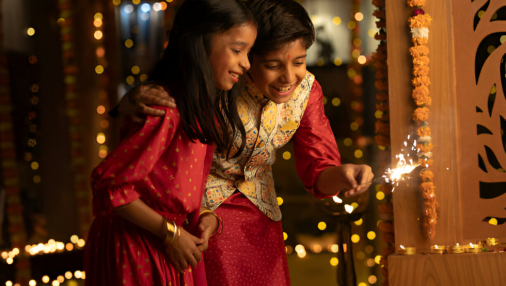Why We Celebrate Diwali in India
Diwali, the Festival of Lights, is one of the grandest celebrations in India. It symbolizes the victory of good over evil, light over darkness, and knowledge over ignorance. But why do we truly celebrate Diwali? Let’s explore the history, traditions, and modern significance of this vibrant festival.
The Mythological Significance of Diwali
Diwali’s importance is rooted in multiple legends across India’s diverse traditions:
1. Return of Lord Rama
According to the Ramayana, after defeating Ravana and completing 14 years of exile, Lord Rama returned to Ayodhya with Sita and Lakshmana. People celebrated by lighting diyas, marking the triumph of good over evil.
2. Goddess Lakshmi
Diwali is linked to the birth of Goddess Lakshmi during the Samudra Manthan (churning of the ocean). Devotees worship her on Diwali night for prosperity and good fortune.
3. Krishna and Narakasura
In South India, Diwali is associated with Lord Krishna’s victory over Narakasura, celebrated on Naraka Chaturdashi, the day before Diwali.
4. Sikh Tradition
For Sikhs, Diwali is remembered as Bandi Chhor Divas, the release of Guru Hargobind Ji and 52 princes from Mughal imprisonment.
5. Jain Tradition
Jains celebrate Diwali as the day Lord Mahavira attained nirvana, marking his liberation and spiritual victory.
How Diwali is Celebrated
Diwali is a five-day festival, each day carrying its own rituals and meaning:
- Dhanteras: The first day, when people buy gold, silver, or utensils for prosperity.
- Choti Diwali (Naraka Chaturdashi): Celebrated for Krishna’s victory over Narakasura.
- Main Diwali Day: Families worship Goddess Lakshmi and Lord Ganesha, decorate homes with lights and rangolis, and exchange sweets.
- Govardhan Puja/Padwa: Commemorates Lord Krishna lifting Govardhan Hill; Annakut feasts are prepared.
- Bhai Dooj: Marks the bond of brothers and sisters with tilak and prayers.
Cultural Importance of Diwali
- Unity in Diversity: Celebrated by Hindus, Sikhs, Jains, and Buddhists in unique ways.
- Festival of Giving: People donate food, clothes, and money to the needy.
- Family Reunions: Families gather, exchange gifts, and enjoy festive meals.
- Arts & Culture: Homes are adorned with rangoli, diyas, and decorations.
The Modern Relevance of Diwali
Today, Diwali is celebrated worldwide, from New York to Singapore. It boosts India’s economy with massive shopping and festive sales, while eco-friendly celebrations are gaining popularity to reduce pollution. It remains a festival that unites people beyond boundaries.
Why We Truly Celebrate Diwali
Diwali teaches us eternal values:
- Light always conquers darkness.
- Good always triumphs over evil.
- Knowledge is the greatest form of wealth.
- Love and unity bring true prosperity.
Conclusion
Diwali is not just a festival—it is a reminder of hope, renewal, and the power of light. Every diya lit represents positivity and the promise of a brighter tomorrow. Whether seen as Lord Rama’s homecoming, Goddess Lakshmi’s blessing, or Mahavira’s nirvana, its essence remains the same: spread light, share love, and celebrate life.

